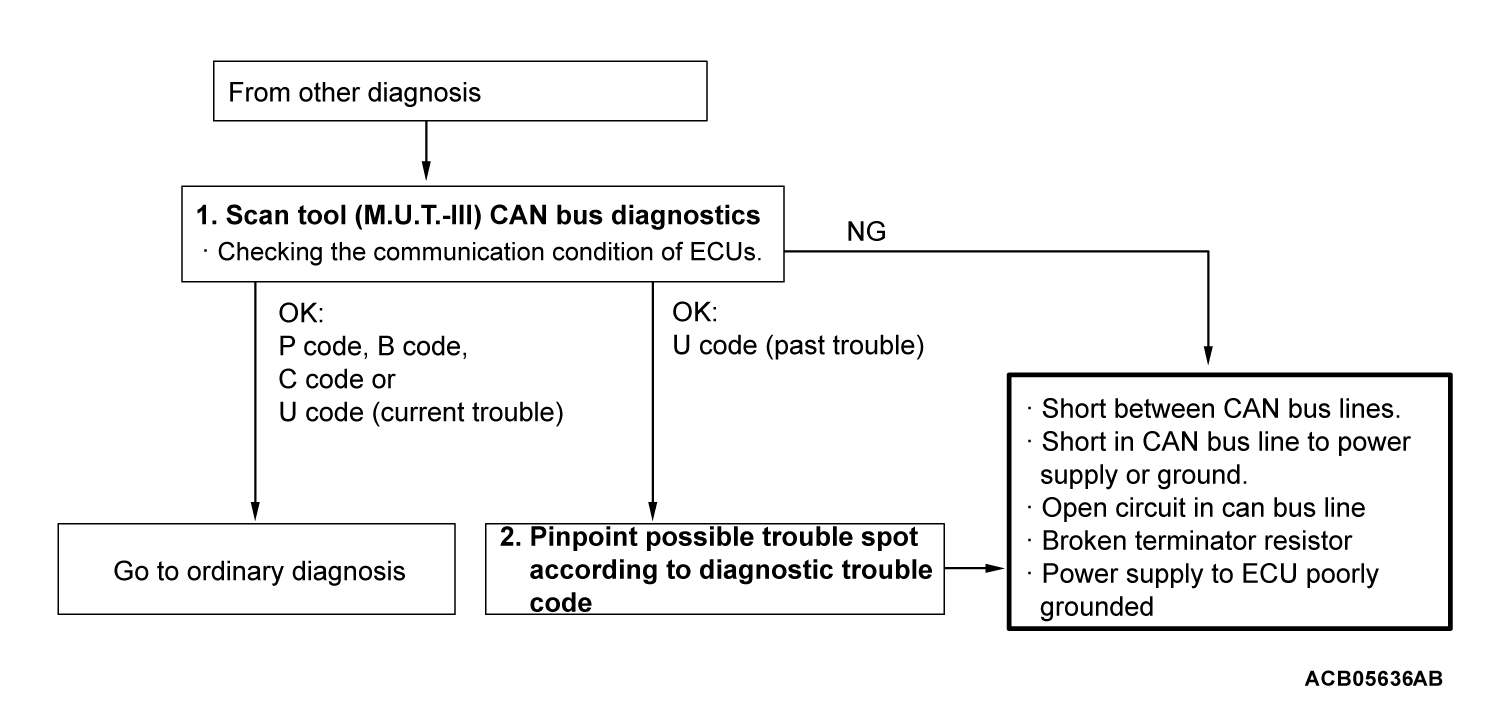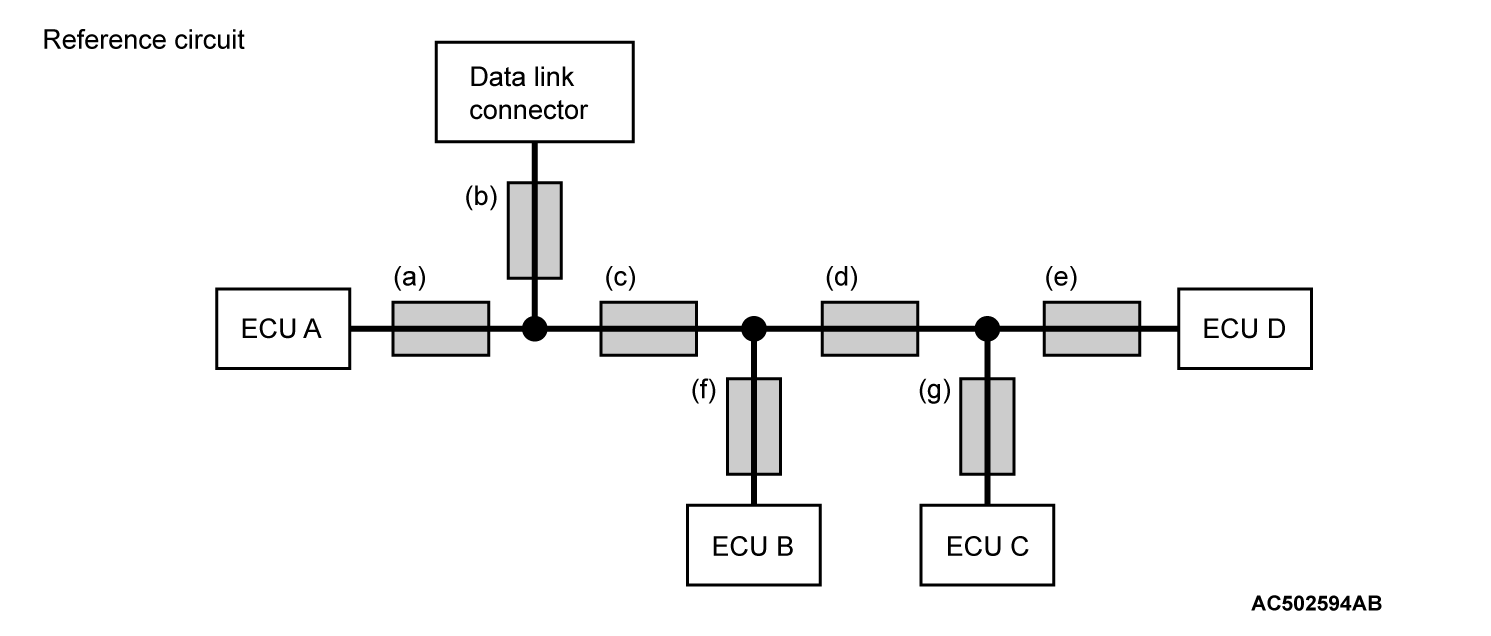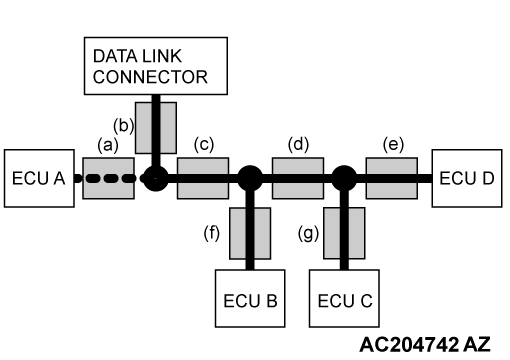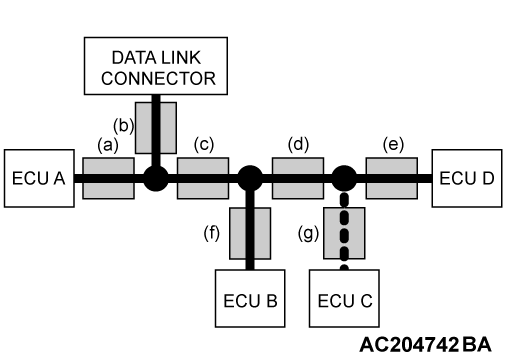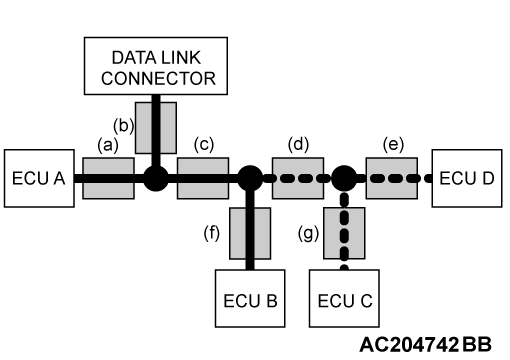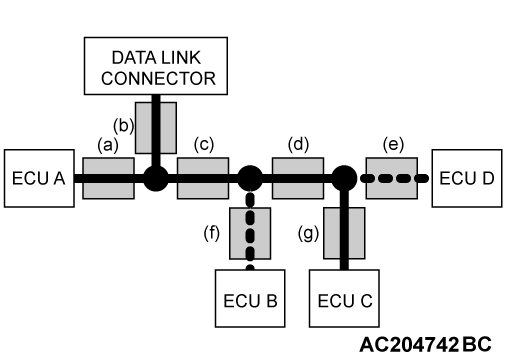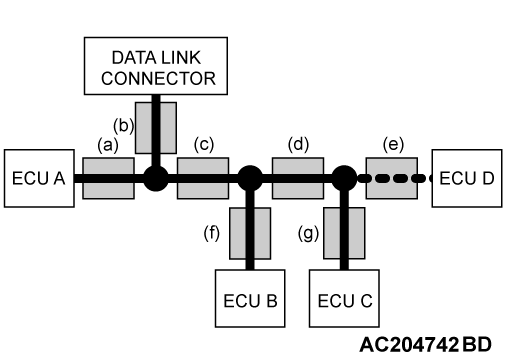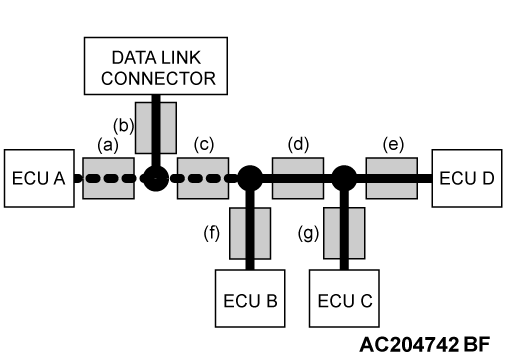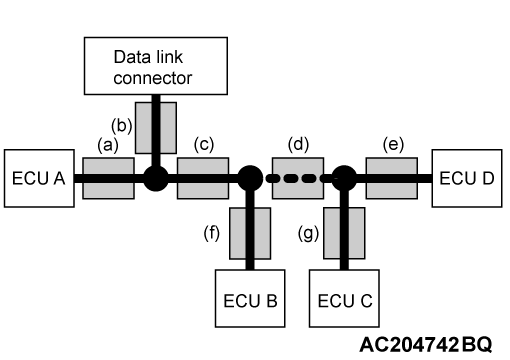EXPLANATION ABOUT THE SCAN TOOL (M.U.T.-IIISE) CAN BUS DIAGNOSTICS
Scan tool (M.U.T.-IIISE) CAN bus diagnostics carries out the three checks below automatically, and then displays current condition of the CAN bus lines according to the check results.
CAN BUS LINE DIAGNOSTIC FLOW
1. Scan tool CAN bus diagnostics
Scan tool (M.U.T.-IIISE) diagnoses CAN bus lines in accordance with the following strategy.
- Checking the communication condition of ECUsScan tool (M.U.T.-IIISE) narrows down troubles in circuit by itself. Its strategies are as follows.
| ECU which cannot communicate with the scan tool | Possible trouble spot | Logic for narrowing down trouble spot | |
| ECU A | CAN bus line (a) and power supply system to ECU A | ECU A communicates with the scan tool (M.U.T.-IIISE) via CAN bus lines (a) and (b). The scan tool (M.U.T.-IIISE) judges that CAN bus line (b) is normal, because it can communicate with other ECUs. Possible trouble may be present in CAN bus line (a) or the power supply system to ECU A. | |
| ECU C | CAN bus line (g) and power supply system to ECU C | ECU C communicates with the scan tool (M.U.T.-IIISE) via CAN bus lines (b), (c), (d) and (g). The scan tool (M.U.T.-IIISE) judges that CAN bus lines (b), (c) and (d) are normal, because it can communicate with ECUs B and D. Possible trouble may be present in CAN bus line (g) or the power supply system to ECU C. | |
| ECU C and ECU D | Trouble in CAN bus line (d) | ECUs C ad D communicate with the scan tool (M.U.T.-IIISE) via CAN bus lines (b), (c), (d), (e) and (g). The scan tool (M.U.T.-IIISE) judges that CAN bus lines (b) and (c) are normal, because it can communicate with ECU B. Possible trouble may be present in CAN bus line (d), (e) or (g) or the power supply system to ECU D or C. CAN bus line (d) is shared by ECUs C and D when they communicate with the scan tool (M.U.T.-IIISE), so CAN bus line (d) is suspected as ultimate cause. CAN bus line (g) or (e) and power supply systems to ECU C or D are also suspected as second cause. | |
| ECU B and ECU D | CAN bus line (e) or (f) or power supply system to ECU B or D | ECUs B ad D communicate with the scan tool (M.U.T.-IIISE) via CAN bus lines (b), (c), (d), (e) and (f). The scan tool (M.U.T.-IIISE) judges that CAN bus lines (b), (c) and (d) are normal, because it can communicate with ECU C. Possible trouble may be present in CAN bus line (f) or (e) or the power supply system to ECU B or D. | |
2. If DTC related to CAN communication is set as past trouble, isolate opens as described below.
| note | If you pinpoint trouble spot according to DTC, you should use time-out DTC. DTC related to failure information is set when the data to be stored contains an error, so CAN bus line itself is probably normal. |
| note | Time-out DTCs are stored in each ECU memory individually. Therefore, it is possible that these DTCs have not been set simultaneously. If the trouble spot cannot be found when you diagnose by judging from multiple DTCs, check the communication lines between each ECU. |
| DTC to be set | Possible trouble spot | Logic for narrowing down trouble spot | |
| Time-out DTC associated with ECU D is set in ECU A, ECU B and ECU C. | Trouble in CAN bus line (e) and power supply system to ECU D | When time-out DTC associated with ECU D is set in ECU A, B and C, or time-out DTC associated with ECUs A, B and C is set in ECU D, CAN bus line (e) is suspected. When DTC is not set in ECU D, the power supply to ECU D is suspected. | |
| Time-out DTC associated with ECUs A, B, C and D is set in ECU. | |||
| Time-out DTC associated with ECU A is set in ECUs B, C and D. | Trouble in CAN bus line (a) or (c) and power supply system to ECU A. | When time-out DTC associated with ECU A is set in ECUs B, C and D, or time-out DTC associated with ECUs B, C and D is set in ECU A, CAN bus line (a) or (c) is suspected. When DTC is not set in ECU A, the power supply to ECU A is suspected. | |
| Time-out DTC associated with ECUs B, C and D is set in ECU A. | |||
| Time-out DTCs associated with ECUs C and D are set in ECU A and ECU B. | Trouble in CAN bus line (d) | If time-out DTCs associated with ECUs C and D are set in ECUs A and B, or time-out codes associated with ECUs A and B are set in ECUs C and D, CAN bus line (d) is suspected. CAN bus line (g) or (e) and power supply systems to ECU C or D are also suspected as second cause. | |
| Time-out DTCs associated with ECUs A and B are set in ECU C and ECU D. | |||
![[Previous]](../../../buttons/fprev.png)
![[Next]](../../../buttons/fnext.png)
